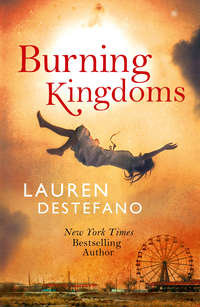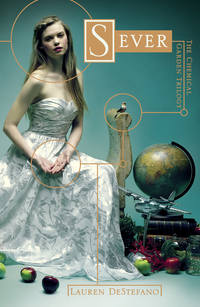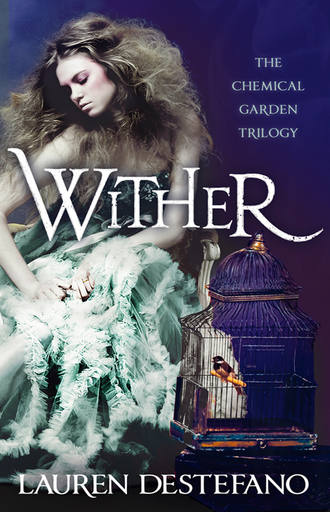
Полная версия
Wither
“What’s wrong with her?”
“Virus,” he says, and when he turns to face me, he has a look of genuine curiosity. “You’ve never seen someone with the virus?”
“Not up close,” I say.
“Not even your parents?”
“No.” My parents were first generation, well into their fifties when my brother and I were born, but I’m not sure I want to tell him this. Instead I say, “I try really hard not to think about the virus.”
“Me too,” he says. “She asked for you, after you left. Your name is Rhine?”
He’s looking at me now, so I nod, suddenly aware that I’m naked under these blankets. I draw them closer around myself. “What’s your name?”
“Gabriel,” he says. And there it is again, that almost smile, hindered by the weight of things. I want to ask him what he’s doing in this awful place with its beautiful gardens and clear blue pools, symmetrical green hedges. I want to know where he came from, and if he’s planning on going back. I even want to tell him about my plan to escape—if I ever formulate a plan, that is. But these thoughts are dangerous. If my brother were here, he’d tell me to trust nobody. And he’d be right.
“Good night,” the boy, Gabriel, says. “You might want to eat and get some sleep. Tomorrow’s a big day.” His tone implies I’ve just been warned of something awful ahead.
He turns to leave, and I notice a slight limp in his walk that wasn’t there this afternoon. Beneath the thin white fabric of his uniform, I can see the shadow of bruises beginning to form. Is it because of me? Was he punished for making my escape down the hallway possible? These are more questions that I don’t ask.
Then he’s gone. And I hear the click of a lock turning in the door.
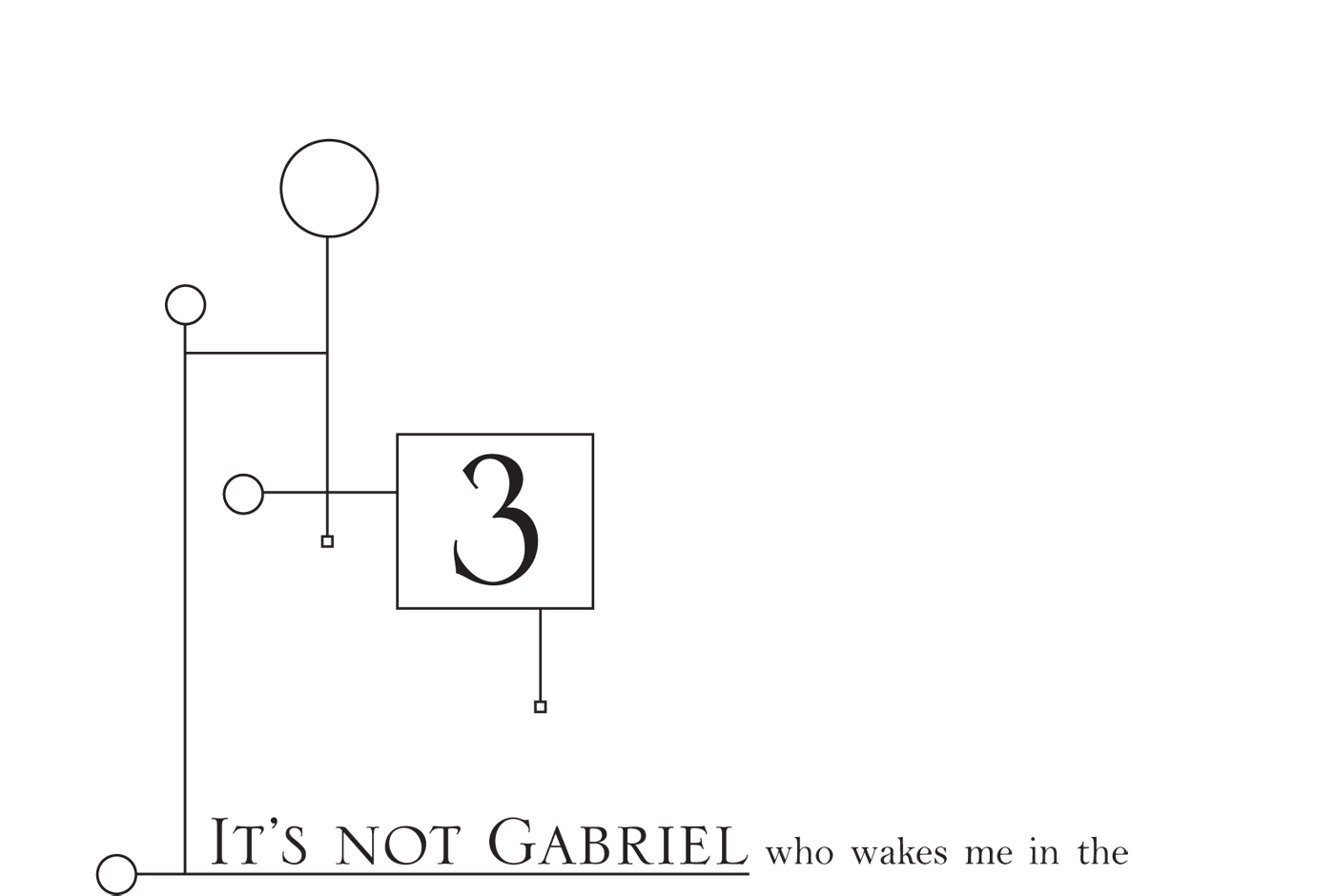
morning, but a parade of women. They’re first generation, if the gray hair is any indication, though their eyes still sparkle with the vibrancy of youth. They are chattering among themselves as they yank the blankets from me.
One of the women looks over my naked body and says, “Well, at least we won’t have to wrestle this one out of her clothes.”
This one. After everything that’s happened, I almost forgot that there are two others. Trapped in this house somewhere, behind other locked doors.
Before I can react, two of the women have grabbed me by the arms and are dragging me toward the bathroom that connects to my room.
“Best if you don’t struggle,” one of them says cheerfully. I stagger to keep pace with them. Another woman stays behind to make my bed.
In the bathroom they make me sit on the toilet lid, which is covered in some sort of pink fur. Everything is pink. The curtains are flimsy and impractical.
Back home we covered our windows with burlap at night to give the impression of poverty and to keep out the prying eyes of new orphans looking for shelter and handouts. The house I shared with my brother has three bedrooms, but we’d spend our nights on a cot in the basement, sleeping in shifts just in case the locks didn’t hold, using our father’s shotgun to guard us.
Frilly, pretty things have no place in windows. Not where I come from.
The colors are endless. One woman draws a bath while the other opens the cabinet to a rainbow of little soaps that are shaped like hearts and stars. She drops a few of them into the bathwater, and they sizzle and dissolve, leaving a frothy layer of pink and blue. Bubbles pop like little fireworks.
I don’t argue when I’m told to get into the tub. It’s awkward being naked in front of these strangers, but the water looks and smells appealing. It’s so unlike the bleary yellowed water that runs through the rusty pipes in the house I shared with my brother.
Shared. Past tense. How could I let myself think this way?
I lie in the sweet-smelling water, and the bubbles pop against my skin, bringing samples of cinnamon and potpourri and what I imagine real roses must smell like. But I will not be hypnotized by the wonder of these small things. Defiantly I think of the house I share with my brother, the house where my mother was born at the threshold of the new century. It has brick walls still imprinted with the silhouette of ivy that has long since died. It has a fire escape with a broken ladder, and on its street all the houses are close enough together that as a child I would hold my arms out my bedroom window to hold the hands of the little girl who lived next door. We would string paper cups across the divide and talk to each other in giggles.
That little girl was orphaned young. Her parents were the new generation. She barely knew her mother, her father fell ill, and then one morning I reached for her and she was gone.
I was inconsolable, that girl having been my first true friend. I still think of her bright blue eyes sometimes, the way she’d toss peppermints at my bedroom window to wake me for a game of paper-cup telephone. Once she was gone, my mother held the string we had used for our game of telephone, and she told me it was kite string, that when she was a little girl she would spend hours in the park flying kites. I asked her for more stories of her childhood, and on some nights she gave them to me. Stories of towering toy stores and frozen lakes where she would skate swanlike into figure eights, and of all the people who had passed beneath the very windows of this very house when it was young and covered in ivy, and when the cars were parked in neat, shiny rows along the street, in Manhattan, New York.
When she and my father died, my brother and I covered the windows with burlap potato and coffee bean sacks. We took all our mother’s beautiful things, all our father’s important clothes, and stuffed them into trunks that locked. The rest we buried in the yard, late at night, beneath the ailing lilies.
This is my story. These things are my past, and I will not allow them to be washed away. I will find a way to have them back.
“She has such agreeable hair,” one of the women says, scooping warm cupful after cupful of frothy water over my head. “Such a lovely color, too. I wonder if it’s natural.” Of course it’s natural. What else would it be?
“I bet that’s what the Governor liked about her.”
“Let me see,” says the other woman, cupping my chin and tilting it. She studies my face and then gasps, letting her hand flutter spasmodically against her heart. “Oh, Helen, look at this girl’s eyes!”
They both stop bathing me long enough to look at me. Really look at me, for the first time.
My eyes are usually the first thing people notice, the left eye blue and the right eye brown, just like my brother’s. Heterochromia; my parents were geneticists, and that was the name they gave my condition. I might have asked them more about it when I grew older, if I’d had the chance. I had always thought the heterochromia was a useless genetic glitch, but if the women are right and my eyes are what the Governor noticed, heterochromia has saved my life.
“Suppose those are real?” one woman asks.
“What else would they be but real?” This time I speak aloud, and they’re startled, then delighted. Their doll has a voice. And suddenly they’re all questions. Where am I from, do I know where I am, don’t I just love the view, do I like horses—there’s a lovely stable—do I prefer my hair up or down?
I answer none of these. I will share nothing with these strangers—however well intentioned they may be—who are a part of this place. The questions come so fast that I wouldn’t know where to begin anyway, and then there’s a soft knock at the door.
“We’re getting her ready for the Governor,” one of the women says.
The muffled voice on the other side of the door is soft, gentle, and young. “Lady Rose would like to speak to her right this moment, please.”
“We’re only half done bathing her! And her nails—”
“Excuse me,” the voice on the other side of the door says patiently, “I have a direct order to bring her now, whatever condition she may be in.”
Lady Rose is apparently someone who has the final say in things, because the women are tugging me to my feet, patting me dry with a pink towel, brushing my wet hair, and slipping me into a robe that feels like waves of silk against my skin. Whatever was in that bathwater has heightened my neurons, left me feeling unpeeled and exposed. I still feel as though bubbles are popping against my skin.
When the door opens, I see that the voice belongs to a little girl, barely half my height. She is dressed like the older women, though, in the feminine version of the white blouse Gabriel wore, with a tiered black skirt, where Gabriel had worn black pants. Her hair is braided into a circle around her head, and her cheeks bloom into apple shapes when she smiles at me. “You’re Rhine?”
I nod. “I’m Deirdre,” she says, and puts her hand in mine. It is cool and soft. “It’s just this way,” she says, and leads me out of my room and along the hallway down which I made my brief escape yesterday.
“Now,” the girl says, nodding seriously, her eyes focusing ahead. “Just speak if spoken to; she doesn’t like questions, so you’d do best not to ask any; refer to her as Lady Rose; there’s a button above her night table, a white one—press it if she becomes ill. She’s in charge of things. The House Governor will do anything she asks, so be sure to stay on her good side.”
We stop before the door, and Deirdre reties the belt of my robe into a perfect bow. She knocks on the semi-open door and says, “Lady Rose? I brought her like you said.”
“Well, then, let her in,” Rose snaps. “And go make yourself useful somewhere else.”
As she turns to leave, Deirdre clasps both of her hands around one of mine. Her eyes are round as moons. “And please,” she whispers, “try to avoid the topic of death.”
When she’s gone, I push the door open and step only as far as the threshold. From here I can smell the medications Rose complained of yesterday. I see the assortment of lotions, pills, and bottles on her nightstand.
She’s sitting up today, in a satin-upholstered divan by the window. Her blond hair is tangled in sunlight, and her skin appears to be less sallow. There’s color in her cheeks, and at first I think she’s feeling better, but when she beckons me closer, I can see the unusual, almost neon pink of her cheeks, and I know it must be cosmetics. I know the red of her lips must not be real either. What are real are her eyes, incredibly brown things that stare at me with intensity, with youth. I try to imagine a world of natural humans, when twenty was youthful, when it was years from a death sentence.
Natural humans used to live for at least eighty years, my mother told me. Sometimes a hundred. I hadn’t believed her.
Now I can see what she meant. Rose is the first twenty-year-old I’ve spoken to at length, and though she’s stifling a cough that sprays blood into her fist, her skin is still smooth and soft. Her face is still full of light. She doesn’t look very different from, or very much older than, me.
“Sit,” she tells me. I find a chair across from her.
There are wrappers all over the floor around her, and a bowl filled with candies on her divan. When she speaks, I can see that her tongue is bright blue. She fiddles with another candy in her long fingers, bringing it close to her face, almost looking like she’ll kiss it. Instead she lets it fall back into the bowl.
“Where are you from?” she asks. Her voice has none of the peevishness she showed Deirdre at the door. Her thick eyelashes flutter up. She watches an insect spiral around her and disappear.
I don’t want to tell her where I’m from. I’m supposed to sit here and be polite, but how can I? How can I when I’m made to sit and watch her die so I can be given to her husband and forced to bear children I never wanted?
So I say, “Where were you from when they took you?”
I’m not supposed to ask her questions, and as soon as I’ve asked it, I realize I have stepped on a land mine. She’ll be screaming for Deirdre or her husband, the House Governor, to take me away. Lock me in a dungeon for the next four years.
To my surprise she only says, “I was born in this state. This town, in fact.” She reaches up behind her, takes a picture from the wall, and holds it out for me. I lean in to get a look.
The photo is of a young girl standing beside a horse. She’s holding the reins, and her smile is so bright that her teeth dominate her face. Her eyes are nearly closed with all the delight of it. Beside her, a much taller boy stands with his hands behind his back. His smile is more controlled, shy, as though he hadn’t meant to smile but couldn’t help himself in the moment.
“This was me,” Rose says of the girl in the photo. Then she traces her finger over the boy’s outline. “This is my Linden.” For a moment she seems lost in the sight of him. A little smile comes to her painted lips. “We grew up together.”
I’m not sure what to say to this. She is so lost in this memory, and so blind to my imprisonment. But still I feel sorry for her. In another time, under different circumstances, she would not have needed to be replaced.
“See?” she says, still pointing to the photo. “This is in the orange grove. My father owned acres of them. Here in Florida.”
Florida. My heart sinks. I’m in Florida, on the bottom of the East Coast, more miles from home than I can count. I miss my ivy-silhouetted house. I miss the distant commuter trains. How will I ever find my way back to them?
“They’re lovely,” I say of the oranges. Because it’s true, they are lovely. Things seem to thrive in this place. I would never have suspected that the vibrant girl standing beside her horse in the grove could be dying now.
“Aren’t they?” she says. “Linden prefers flowers, though. There are orange blossom festivals in the spring. That’s his favorite. In the winter there are snow festivals, and solstice dances—but he doesn’t like those. Too loud.”
She unwraps a green candy and pops it into her mouth. She closes her eyes for a moment, apparently savoring the flavor. The candies are each a different color, and this one, the green, has a peppermint smell that takes me back to my childhood. I think of the little girl who would throw her candies into my bedroom, how their smell would fill the paper cup into which I’d respond to her voice.
When Rose speaks again, her tongue has taken on the emerald color of the candy. “But he’s an excellent dancer. I don’t know why he’s such a wallflower.”
She sets the picture on the divan in a sea of wrappers. I can’t decide what to make of this woman, who is weary and so sad, and who snapped at Deirdre but is treating me like a friend. My curiosity quells my bitterness for the moment. I think, in this strange world of beautiful things, there may be some humanity after all.
“Do you know how old Linden is?” she asks me. I shake my head. “He’s twenty-one. We’d planned to marry since we were children, and I suppose he thought all these medicines would keep me alive for four extra years. His father is a very prominent doctor—first generation. Toiling away at finding an antidote.” She says that last bit fancifully, letting her fingers flutter in the air. She does not think an antidote is possible. Many do, though. Where I come from, hordes of new orphans will file into laboratories, offering themselves up to be guinea pigs for a few extra dollars. But an antidote never arrives, and a thorough analysis of our gene pool turns up no abnormalities to explain this fatal virus.
“But you,” Rose says. “Sixteen is perfect. You can spend the rest of your lives together. He won’t have to be alone.”
I feel the room go cold. Outside there are things buzzing and chirping in the infinite garden, but they are a million miles from me. I had almost, for just a moment, forgotten why I’m here. Forgotten how I arrived. This beautiful place is dangerous, like milky white oleanders. The thriving garden is meant to keep me inside.
Linden stole his brides so he wouldn’t have to die alone. What about my brother, alone in that empty house? What about the other girls who were shot to death in that van?
My anger is back. My fists clench, and I wish someone would come to take me out of this room, even if it means being imprisoned somewhere else in this house. I cannot bear another moment in Rose’s presence. Rose with her open window. Rose who has mounted a horse and ridden beyond the orange groves. Rose who intends to pass her death sentence on to me once she’s gone.
My wish comes true, to make matters worse. Deirdre returns and says, “Excuse me, Lady Rose, the doctor is here to prepare her for Governor Linden.”
I’m led down the hall again, and into an elevator that requires a key card in order to work. Deirdre stands beside me, looking rigid and worried. “You’ll meet Housemaster Vaughn tonight,” she whispers. The blood has drained from her face, and she looks at me in a way that reminds me she’s just a child. Her lips purse in—what? Sympathy? Fear? I don’t know, because the elevator doors open and she returns to herself, guiding me down another, darker hallway that smells of antiseptic, and through another door.
I wonder if she has any advice for me this time, but she’s not even given the chance to speak before a man says, “Which one is this?”
“Rhine, sir,” Deirdre says, not raising her eyes. “The sixteen-year-old.”
I wonder, briefly, if this man is the Housemaster or the Governor who’s to be my husband, but I don’t have the chance to even look at him before there’s a stinging pain in my arm. I have only time to process what I’m seeing: a sterile, windowless room. A bed with a sheet, and restraints where arms and legs might go.
Keeping in theme with all the other things in this place, the room fills with shimmering butterflies. They all quiver, and then burst like the strange bath bubbles. Blood everywhere in their wake. Then blackness.
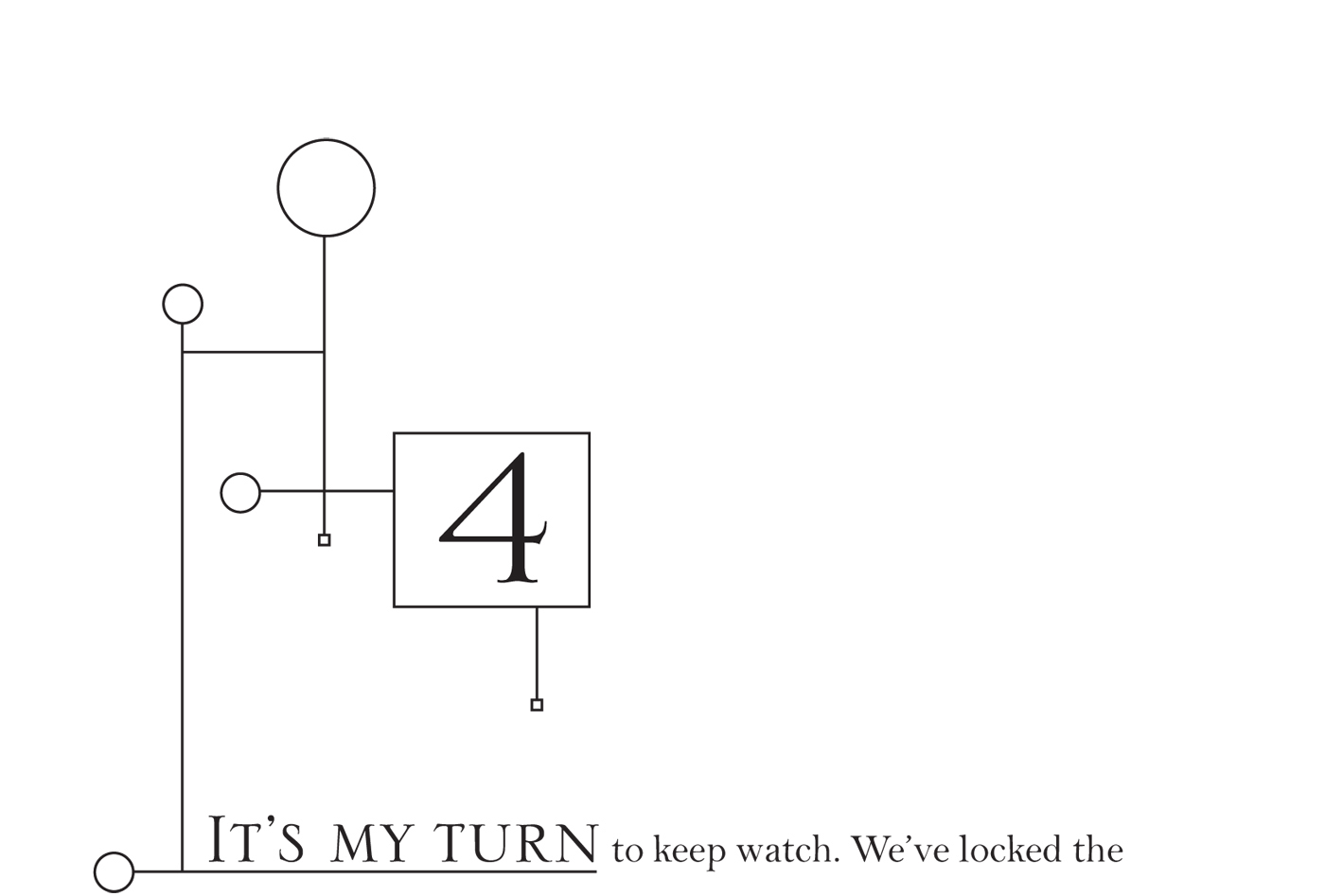
doors and windows and barricaded ourselves in the basement for the night. The tiny refrigerator hums in the corner; the clock is ticking; the lightbulb swings on its wire, doing erratic things with the light. I think I hear a rat in the shadows, foraging for crumbs.
Rowan is snoring on the cot, which is unusual, because he never does. But I don’t mind. It’s nice to hear the sound of another human, to know that I’m not alone. That in a second he would be awake if there were any trouble. As twins, we make a great team. He has the muscles, and his aim with the shotgun never misses, but I’m smaller and faster, and sometimes more alert.
We’ve only had one thief ever who was armed, the year I turned thirteen. Mostly the thieves are small children who will break windows or attempt to pick the lock, and they only stay long enough to realize there’s nothing to eat or nothing worth stealing. They’re pests, and I would just as soon feed them so they’d go away. We have plenty to spare. But Rowan won’t allow it. Feeding one is feeding them all, and we don’t own the goddamn city, he’d say. That’s what orphanages are for. That’s what laboratory wages are for. Or how about the first generations? he’d say; how about the first generations do something because they caused this whole mess.
The armed thief was a man twice my size, at least into his twenties. He somehow picked the lock on our front door without making a sound, and he figured out quickly that the residents of our little house were hiding somewhere, guarding what was worth taking. It was Rowan’s watch that hour, but he’d fallen asleep after a full day of physical labor. He takes work where and when he can get it, and it’s always arduous; he’s always in pain at the end of the day. Long ago, America’s factory jobs were outsourced to other industrialized countries. Now, because there’s no importing, most of New York’s towering buildings have been converted to factories that make everything from frozen food to sheet metal. I’m usually able to find work handling wholesale orders by phone; Rowan finds work easily in shipments and delivery, and it exhausts him more than he cares to admit. But the pay is always cash, and we’re always able to buy more than we need in terms of food. Shopkeepers are so grateful to have paying customers—as opposed to the penniless orphans who always try to steal the essentials—that they give us deals on extras like electrical tape and aspirin.
So there we were, both asleep. I awoke with a blade to my throat, looking into the eyes of a man I did not know. I made a small sound, not even a whimper, but that was all it took for my brother to jolt back to consciousness, gun at the ready.
I was helpless, paralyzed. Small thieves I could handle, and most thieves did not want to kill us, not if they could help it. They only made meager threats on the hope of getting food, a piece of jewelry, and if they were smaller than you, they would just run away when you caught them. They were only trying to survive however they could.
“Shoot me, and I cut her,” the man said.
There was a loud sound, like the time one of our pipes burst, and then I saw a line of blood roll over the man’s brow. It took a second for me to realize there was a red bullet hole in his forehead, and then the knife went slack against my neck. I grabbed it, kicked him away from me. But he was already dead. I sat up, eyes bulging, gasping. Rowan was on his feet, though, checking to be sure the man was really dead, not wanting to waste another bullet if it wasn’t necessary. “Goddamn it,” he said, and kicked the man. “I fell asleep. Damn it!”
“You were tired,” I said reassuringly. “It’s okay. He would have gone away if we’d fed him.”
“Don’t be so naive,” Rowan said, and lifted the dead man’s arm pointedly. It was then that I noticed the man’s gray coat. The clear mark of a Gatherer on the job. “He wanted—,” Rowan began, but couldn’t finish the thought aloud. It was the first time I’d ever seen him tremble.
I had thought, before that night, that Gatherers swept young girls from the street. While this is true, it isn’t always the case. They can stake a girl out, follow her home, and wait for an opportunity. That is, if they think she’s worth the trouble, if they think she’ll get a good price. And that’s what had happened. That’s why the man had broken into our home. Now my brother refuses to let me go anywhere unless he’s with me. He worries over our shoulders, peers into alleyways we pass. We’ve added bolts to the door. We’ve strung the kitchen floor in a labyrinth of kite strings and empty aluminum cans so that we’ll be alerted—loudly—to any intruders before they can hope to break into our basement.
I hear something else now, something I at first assume is another rat scurrying around upstairs. It would be the only thing small enough to wind a path around our trap. But then the basement door begins to rattle at the top of the steps. The bolts pop open, one at a time.
Behind me, Rowan has stopped snoring. I whisper his name. I say I think someone has broken in. He doesn’t answer me. I turn around, and the cot is empty.
At the top of the stairs, the basement door flies open. But instead of the darkness of our house, there’s sunlight, and the most breathtaking garden I have ever seen. I barely have time to take it all in before the doors close in front of me. The doors of a gray van, a van full of frightened girls.
“Rowan,” I gasp, and throw myself upright.
Awake. I’m awake now, trying to console myself. But reality does not offer a safe haven. I’m still in this Florida mansion, still the intended bride of the House Governor, and Rose is gasping for her life down the hall while voices try to soothe her.
My legs and hips feel sore when I stretch them against the satin sheets. I peel back the blankets, assess myself. I’m wearing a plain white slip. My skin is tingling and hairless. My nails have been rounded and polished. I’m back in my bedroom, with its window that doesn’t open and its bathroom so pink it’s practically glowing.




